Our Futures: Virtual Talk Series from the GLBT Center

The past year has been an immensely challenging one for our students. There is no one single event that made 2020 so difficult, but rather a culmination of historical events and tensions. The new question on the mind of university programmers is, how do we offer the same quality of student support from a distance? How do we navigate the hard conversations around student protests, and the demands for accountability that we haven’t had? This current moment in time feels chaotic and the future unimaginable. This is why the GLBT Center is offering a new signature program called Our Futures to help students see themselves existing past this particularly turbulent time in their lives.
What is Our Futures?
A program that provides an opportunity for local LGBTQ community leaders to engage in intimate and ongoing conversations with our students about life, careers, self-advocacy and self-discovery while also being LGBTQ within the Raleigh-Durham-Chapel Hill area, Our Futures aims to provide conversations that help our students envision possibilities for their own futures.
How is it planned?
The GLBT Center staff gather to discuss struggles, interests, life changes, etc. we’ve heard our students mention and use our networks to find local leaders who share those experiences. We choose three to four community leaders of diverse experiences, identities and ethnicities for each semester. The guests are asked to come up with a two-part interactive talk to share their own journey, plus answer questions and/or give advice to students. One guest each month will share their personal life stories and give advice over the course of their visits. Some guests might even do a performance or skill share.
What should attendees expect?
Two Sunday evening conversations (from 5–6 p.m.) per month from one of our speakers. Our Futures is not meant to define what a “successful” or “ideal” life looks like; it is meant to give students direct access to community leaders who might have experiences that mirror theirs, including struggles with mental health, starting a business, leaving higher education, starting a family, or losing a job in the middle of a pandemic, to name a few.
Why? Our students want to know that they can stumble, survive and thrive, in no particular order, through life and still exist. Who is this for? Undergraduate and graduate students who are part of the LGBTIQQA+ community and any student who thinks that they would benefit in hearing about future possibilities for themselves. Some of our guest speakers will be artists, performers, practitioners, etc. You do not have to identify as being part of the LGBTQ community, but this space is a social support network that does center LGBTQ individuals. This space is not to research, criticize, judge or interrogate others on their identities or expressions.
Who are the guests this semester?
Kori Hennessey (they/them pronouns) is the director of education and programs at the LGBT Center of Raleigh. They have a B.A. in psychology and are currently in the Nonprofit Management program at Duke University. Hennessey is also a certified trainer with the Transgender Training Institute. They are passionate about social justice and equity amongst marginalized communities. When not working, they enjoy spending time hiking, camping and being in nature with their partner and three dogs.
“Ay-Jaye” Nelson (he/him pronouns) found dance as a young teenager, falling in love with the freedom of expression that movement allowed. Dancing in earnest from fifteen years on, Nelson’s career has led him to seek training in a variety of styles, building his repertoire in contemporary, modern, hip-hop and jazz, refining his focus in a personal style that blends these traditions. Over the past decade, Nelson has performed with renowned choreographers in the Triangle and beyond, gravitating toward emotionally charged work and contemporary pieces with a social conscience and goal of bringing movement to a broad and diverse audience. Nelson’s belief in the power of dance to change lives and the world has led him to the classroom to share the gift of movement with students of all ages and backgrounds. Being a huge advocate for mental and physical wellbeing, as well as having worked in the Mental Health field for three years, Nelson has found himself showing endless gratitude towards dance and movement for allowing such an avenue to bridge the gap between honing your mind and body as one.
Tori Grace Nichols (they/them pronouns) is a prismatic performance artist who can be seen performing drag with the House of Coxx and causing good trouble around Durham as a cultural organizer. They recently wrote the short audio drama Stretchy Shorts for Artist Soapbox’s Declaration of Love series and voiced the character Bo, who is based on Nichols. Other acting credits include Dreaming (assistant puppeteer) with Duke Performances, Men on Boats (Sumner) with The Justice Theater Project and Freakshow (Mr. Flip) with The Women’s Theatre Festival. They are also the lead documentarian for the abolitionist Kaleidoscopic Dream Projexns project in collaboration with Durham Art Asylum and Gallery of the Streets. They are adopted from the Philippines and identify as queer, genderqueer, trans and disabled
Are you interested yet? We hope your answer is yes. This is a new program, so be prepared to watch it grow. We will host this program every spring and fall semester with different local community leaders. No, you do not have to identify as part of the LGBTQ community, but the program centers that community. Our guests will tell you how they identify, but we will not, because we want you to get to know them.
We miss our students, we stand with our students and we are invested in their futures. For anyone who has suggestions for potential community members you would like to recommend, please email the GLBT Center at glbt-center@ncsu.edu . In the future, we hope our guests may be staff, faculty or administrators within the LGBTQ community at NC State.
Geena Washington is program coordinator in the GLBT Center.
- Categories:


